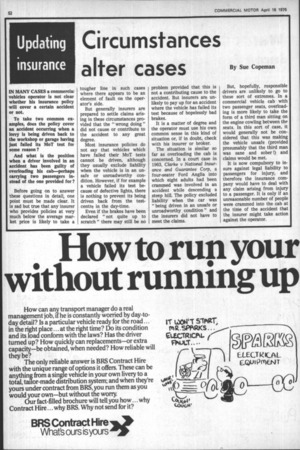Circumstances alter cases
Page 54

If you've noticed an error in this article please click here to report it so we can fix it.
By Sue Copeman
tougher line in such cases where there appears to be an element of fault on the operator's side.
But generally insurers are prepared to settle claims arising in these circumstances provided that the "wrong doing" did not cause or contribute to the accident to any great degree.
Most insurance policies do not say that vehicles which have failed their MoT tests cannot be driven, although they usually exclude liability when the vehicle is in an unsafe or unroadworthy condition. However, if for example a vehicle failed its test because of defective lights, there is nothing to prevent its being driven back from the testcentre in the day-time.
Even if the brakes have been declared "not quite up to scratch " there may still be no problem provided that this is not a contributing cause to the accident. But insurers are unlikely to pay up for an accident where the vehicle has failed its test because of hopelessly bad brakes.
It is a matter of degree and the operator must use his own common sense in this kind of situation or, if in doubt, check with his insurer or broker.
The situation is similar so far as overloading the cab is concerned. In a court case in 1963, Clarke v National Insurance and Guarantee Corp, a four-seater Ford Anglia into which eight adults had been crammed was involved in an accident while descending a steep hill. The policy excluded liability when the car was "being driven in an unsafe or unroadworthy. condition" and the insurers did not have to meet the claims. But, hopefully, responsible drivers are unlikely to go to these sort of extremes. In a commercial vehicle cab with two passenger seats, overloading is more likely to take the form of a third man sitting on the engine cowling between the seats. In this sort of case, it would generally not be considered that this was making the vehicle unsafe (provided presumably that the third man was sane and sober !) and claims would be met.
It is now compulsory to insure against legal liability to passengers for injury, and therefore the insurance company would have to deal with any claim arising from injury to a passenger. It is only if an unreasonable number of people were crammed into the cab at the time of the accident that the insurer might take action against the operator.




























































































